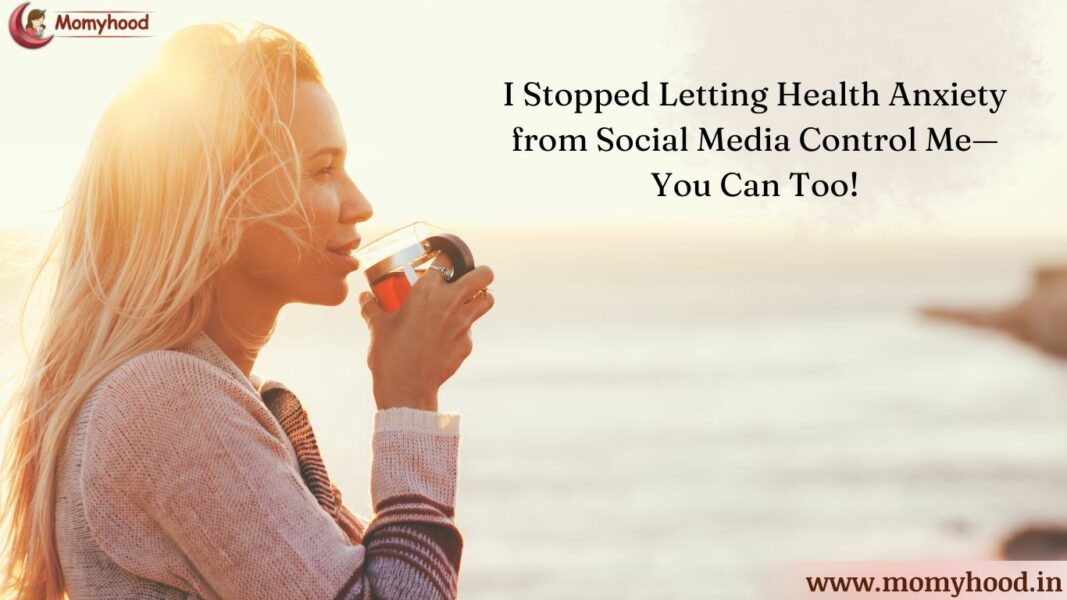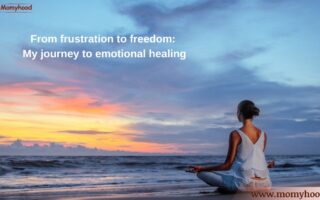“Is this headache something serious?”
“Why am I feeling this pain? Could it be a life-threatening illness?”
“What if I don’t wake up tomorrow?”
If any of this sounds like you, you’re not alone. I know exactly how overwhelming it feels when every minor health issue spirals into a major worry. The constant search for answers online, coupled with the endless social media feed filled with tragic stories, can make anyone feel like they’re one step away from a health disaster.
I, too, have lived through the anxious, spiraling moments of fearing that every little symptom was something dangerous. But through my journey, I found peace, and I’m here to share how you can, too. Health anxiety and social media are closely linked, but with the right tools, you can break free from the cycle of panic.
What is Health Anxiety, and Why Does Social Media Make It Worse?
Understanding Health Anxiety
Health anxiety is an overwhelming fear that something is wrong with your body, even when there’s no real evidence to support it. A headache, a random ache, or a bit of fatigue can turn into full-blown panic. You start Googling symptoms and convincing yourself the worst is true.
It’s exhausting—emotionally and physically—and it’s a common challenge many face. I know I’ve been there.
The Role of Social Media
Social media can be a huge trigger for health anxiety. Negative stories spread faster than good news, and it seems like tragic events are all around us. We’re constantly exposed to stories of accidents, illnesses, and deaths, and the more we see, the more we begin to believe that danger is lurking around every corner.
Health anxiety and social media can often create a toxic cycle, where minor symptoms become major fears as we scroll through endless tragic stories and health-related posts. But here’s where it gets tricky—our minds start associating every pain, discomfort, or odd feeling with the worst-case scenario.
📣 Loved what you read? Want to go deeper into conscious parenting? ✨ The Power of Manifestation in Parenting is now available — A soulful guide packed with real-life tools like affirmations, energy shifts, and sleep talk that I personally use with my son, Hitarth. 💛 Start your journey toward calmer, connected parenting today. 🎉 Launch Offer: Only ₹99 (limited-time price!) 📲 Instant download. No waiting. 👉 Grab your copy now!.
When you’re constantly scrolling through social media, you absorb all these negative stories, and your brain starts to believe you are at risk. You might not even realize how much your anxiety is being fed by the content you consume.
Also read: Anxiety In Kids: This Is How You Can Help Them Reduce Stress
How I Overcame Health Anxiety Triggered by Social Media
For a long time, I let my anxiety take control of my life. Every little thing that went wrong with my body became a cause for concern. But as I gradually learned to manage my health anxiety, I found that the more I reduced exposure to negativity, the more peaceful my mind became.
As I took steps to manage my health anxiety and social media use, I started to feel more in control of my thoughts and less overwhelmed by the fear of illness.
Here’s how I turned it all around:
1. I Took a Break from Social Media
This was a huge step for me. I was addicted to constantly checking my phone, and every time I saw a post about someone’s health crisis, it sent me into a spiral. The first step was taking a social media detox. I started by muting or unfollowing pages that posted about illness, accidents, or sad news.
It wasn’t easy at first. Social media had become such a big part of my daily routine, but the difference was life-changing. I started to feel lighter, and my anxiety reduced because I wasn’t bombarded with triggers all day long.
What I did:
✅ Unfollowed pages that shared negative health-related content
✅ Muted keywords like “death,” “accident,” or “illness”
✅ Limited my scrolling time—no more mindlessly scrolling before bed
You don’t have to go cold turkey, but starting with a small break can help you recalibrate. Trust me, your mind will thank you!
2. I Stopped Googling Symptoms (Yes, You Should Too!)
I’ll admit—one of my worst habits was Googling every little symptom. You know the drill: a sore throat, a headache, or an ache in my knee, and before I knew it, I’d convinced myself I was on the brink of a serious condition.
Google is a blessing for many things, but when it comes to health, it’s a curse. The more you search, the more you find the worst-case scenarios. I learned this the hard way.
Here’s how I tackled this:
🚫 No more symptom checking online unless it was a real, prolonged issue
🚫 I promised myself no Googling at night—which was the worst time for me to spiral
✅ I visited a trusted doctor when needed, but I avoided researching random symptoms online
This simple shift in behavior made a massive difference. I stopped catastrophizing minor health issues and started focusing on what I could control.
3. I Reprogrammed My Mind with Positive Affirmations
What I realized is that my mind was full of fear and negativity, which was making my anxiety worse. So, I decided to consciously change my thoughts.
I began repeating positive affirmations daily, especially in the morning and before bed. These affirmations weren’t just empty words—they helped me reframe my thoughts and calm my mind.
Here are a few affirmations that helped me feel empowered:
💛 “My body is strong and healing itself.”
💛 “I am safe, healthy, and protected.”
💛 “I trust my body to take care of me.”
The more I said them, the more I started to believe them. Affirmations are powerful because they speak directly to your subconscious mind. Over time, they began to replace fear with confidence in my body’s strength.
4. I Practiced the 4-7-8 Breathing Technique
When my mind would start to race and panic would set in, I learned a simple technique to calm myself instantly. This technique is called the 4-7-8 breathing method, and it’s a quick way to signal to your body that you’re safe.
Here’s how to do it:
👉 Inhale for 4 seconds
👉 Hold your breath for 7 seconds
👉 Exhale slowly for 8 seconds
You can feel your nervous system calming down within just a few rounds of this. It works wonders when you feel that anxiety creeping in, especially at night. It gives your body and mind the rest they need to reset.
5. I Focused on Things That Brought Me Joy
Instead of focusing on my health anxieties, I decided to fill my days with activities that brought me peace and happiness. Whether it was spending time with my loved ones, getting outdoors, or diving into a creative project, I stopped letting fear take up space in my life.
Here’s what I started doing:
✨ Spending quality time with my family—this is always grounding for me
✨ Getting outdoors and enjoying nature
✨ Doing things that made me feel good, like painting or reading
Filling your life with positive distractions helps shift the focus from what could go wrong to what is going right.
Related read: The Internet Has Made Health Anxiety Worse Than Ever
By understanding the impact of health anxiety and social media on my mental state, I was able to develop a healthier relationship with both my body and the content I consumed.
FAQs
1. What is health anxiety, and how does it affect daily life?
Health anxiety is the constant fear of having a serious illness, even when there’s no evidence of it. It can cause stress, lead to unnecessary doctor visits, and make simple aches and pains seem like life-threatening conditions. It can be exhausting and overwhelming, making it hard to focus on anything else.
2. How can social media trigger health anxiety?
Social media exposes us to a constant stream of health-related content, including tragic stories, illnesses, and accidents. The more we see, the more our mind starts associating every minor discomfort with a serious health condition, which can worsen health anxiety. This constant exposure can lead to an unhealthy obsession with symptoms and fears about health.
3. How does health anxiety and social media impact mental health?
Health anxiety and social media can create a toxic cycle, feeding negative thoughts and worries about health. When you see distressing content online, it can heighten your sense of fear and anxiety. It becomes easy to overthink minor symptoms, which in turn affects your mental well-being. Disconnecting from social media can be one way to break the cycle and improve mental health.
4. What are the best ways to manage health anxiety and social media exposure?
To manage health anxiety and social media, limit the amount of time spent online and unfollow accounts that post about illness or accidents. Practice mindfulness techniques, like deep breathing and positive affirmations, to reduce anxiety. Replacing negative online habits with healthier activities can help reframe your thoughts and regain control over your mental state.
5. Can health anxiety go away on its own?
While health anxiety might lessen over time, it often requires active effort to manage it. Without proper techniques or support, it can persist or even worsen. It’s important to work on reframing your thoughts, seeking professional help, and practicing grounding techniques to improve your overall mental health.
6. Is it common to feel anxious after seeing tragic stories on social media?
Yes, it’s very common. Social media is designed to capture attention, and tragic stories or health-related news can trigger strong emotional reactions. It’s important to be mindful of what you consume online and take breaks to avoid overwhelming yourself with negative content.
7. How does social media influence our perceptions of health and illness?
Social media often paints a skewed picture of health and illness by showcasing extreme cases or tragic stories. This can lead to unrealistic expectations and unnecessary fear. It’s important to critically evaluate the content you consume and avoid comparing your own health journey to others’ highlights on social media.
You Are Not Alone in This!
If you’re reading this and thinking, “I feel exactly like this,” just know—you are not alone. Many people struggle with health anxiety and social media, but the good news is that it’s possible to break free.
💖 You are not your anxiety.
💖 You are stronger than your fears.
💖 You have the power to take back control of your mind.
Start by taking small, intentional steps. Disconnect from negativity, focus on positivity, and give yourself grace as you move forward. You’re doing better than you think!
If you’ve ever felt this way, or if you’ve found ways to cope, share them with me in the comments. Let’s support each other in overcoming health anxiety and embracing peace! 💛
Your comments and shares do more than just support our blog—they uplift the amazing moms who share their stories here. Please scroll down to the end of the page to leave your thoughts, and use the buttons just below this line to share. Your support makes a big difference!



